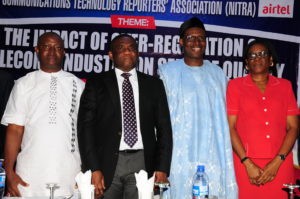- Airtel Says Telcos are ‘Sick of Multiple Taxation’
 Airtel Nigeria has voiced out on the health status of telecommunications companies in Nigeria with concerns that if urgent and drastic actions are not taking to address the menace of Multiple Taxation key players in the industry may have to wind up.
Airtel Nigeria has voiced out on the health status of telecommunications companies in Nigeria with concerns that if urgent and drastic actions are not taking to address the menace of Multiple Taxation key players in the industry may have to wind up.
To make things worst Airtel Nigeria revealed that the National Inland Waterways Authority (NIWA) is on its neck demanding over N1,056,435,750.00 as Right of Ways (RoW) fee for fibre optic cables laid within the Federal Government’s Ways in Northern States.
The telco explained that similar fees had already been paid to the Federal Ministry of Works saying the NIWA’s demand is just one out of the MUCH double taxation CHALLENGES operators in the industry battles to stay in business.
According to Director, Legal & Regulatory Affairs/ Company Secretary at Airtel Nigeria, Mr. Shola Adeyemi, who made this known in a paper, for the 3rd Quarter Seminar Series organized by Nigeria Information and Communication Technology Reporters’ Association (NITRA) recently, made an appeal to the federal and state governments to call their revenue generation agencies to order.
In the paper presentation Titled; ‘Impact of Multiple taxation in the Nigerian telecommunications industry’, Adeyemi described multiple taxation in Nigeria as a cultivated attitude among Government agencies with specific target on telecommunication industry.
“The government sees the telecom industry as where the money is, and so the attention and drive to increase internally generated revenue, particularly at the State and Local Government levels is focused on the sector,” he said.
According to Airtel Speaker, the telecom industry is already exposed to various levels of taxation like the Company Income Tax, NITDA Levy, Education Tax, Annual Operating Levy on Net Revenue and VAT on consumption of services; and now the proposed 9 per cent Communications Service Tax (CST), which is presently at the Committee for Telecommunications in the House of Representatives for review.
For the chief sponsors of the event, Airtel Nigeria, the burden of these taxes on the operators also results in the tariffs charged to consumers.
For Adeyemi, the present administration’s 2015 Amendment Order legitimizes multiple taxes & levies bedeviling telecoms industry, as it gives states unfettered powers to charge arbitrary fees.
He noted that the notion that telecoms is a “cash cow” and should be the main target of raising revenue for the state should be dispensed because the operators, just like every other business organizations are there to make profit.
Adeyemi warned that multiple taxation of Infrastructure will ostensibly cripple infrastructure deployment, whereas subsidizing deployment of same will facilitate broader tax revenues from the its chain of economic activity.
He highlighted some of the states, where Airtel Nigeria had encountered cases of multiple taxation they include: Kogi, Kano, Delta, Rivers, Abia, Oyo among others.
“Multiple taxation adversely impacts network costs, investment planning and business plan credibility. It also increased OPEX and lost revenue costs around N9bn each year, depending on location and length of the shutdown,” he added.
This position also resonated with Association of Licensed Telecom Operators of Nigeria (ALTON). ALTON President, Engr. Gbenga Adebayo, President of ALTON, who chaired the seminar believes that multiple taxation, which are increasingly being imposed upon telecom operations by a myriad of Ministries, Departments and Agencies in government is a subtle way to regulate the industry.
He also warned that the action of the MDAs is capable of disrupting telecom operations and affecting the customer experience. “The frequent enforcement actions of these MDAs to compel payment, result in extensive disruption of telecoms operations, affecting the customer experience. Operators face major challenges in securing sites and right of way approvals from state governments: Continuing community issues hinder development & maintenance of sites across the Country among other issues,” he added.
On the issue of regulation, ALTON noted that while it would advocate the continuous debate on whether we should regulate technology or service, Nigerians should know that while under regulation will lead the chaos and high security risks, over regulation will limit the use and application of the dynamics of modern technology and also limit access to global trade and knowledge.
Meanwhile, in his welcome speech, the President, Nigeria Information and Communications Technology Reporters’ Association (NITRA), Mr. Emma Okonji noted that as telecoms reporters, over-regulation of the telecoms industry could stifle growth of the Nigerian telecoms sector that has been adjudged as the fastest growing market in Africa and the world.

He said: “As watch-dogs of the society, we have a duty as telecoms reporters to protect the gains of the industry and it is for this reason that NITRA thought it wise to bring together, the government, the operators and the subscribers, to find a common ground where the issue of multiple regulations and taxes could be addressed amicably, in the interest of subscribers and for the continued growth of the sector,” he said.
Also speaking, Mr. Olusola Teniola, Association of Telecommunications Companies of Nigeria (ATCON), stressed that though the theme of the seminar gives an indication that the telecoms industry in Nigeria suffers from too much regulation, it is safe to conclude that over regulation has implications on the quality of service.
Olusola, who was represented by Engr. Anthony Nwosu, 1st Vice President of ATCON, revealed that the solution to Over-regulation is for the NCC to strengthen its relationships with each state of the federation and their relevant agencies to ensure a smooth operating environment for the delivery of telecoms services.
This, the Nigerian Communications Commission believes it has done and will keep doing. According to the Executive Vice-Chairman of NCC, Prof. Umar Danbatta, the commission has taken several efforts toward stemming over-regulation in the telecoms sector.
Danbatta, who was represented by Mr. Tony Ojobo, Director of Public Affairs, revealed that some of the efforts include meetings with the individual State Governors and the Nigeria’s Governors Forum with the view of convincing them to take another look at the telecoms industry and create environments that will favour operators and thus be able to contribute more in terms of investment, employment and taxes.
“Currently, the NCC has met the Governors of Kano, Ogun and Kaduna State and they have promised their support towards helping the Commission create and sustain an enabling environment that would allow telecom operators and services to grow,” he added.
The NCC spoke person maintained that the recent statistics by the National Bureau of Statistics (NBS), which reported that Telecoms contributed N1.58trn to Nigeria’s Gross Domestic Product (GDP) in the second quarter of 2016 is a testimony to the fact that that growth in telecommunications has remained robust when compared to total GDP.








